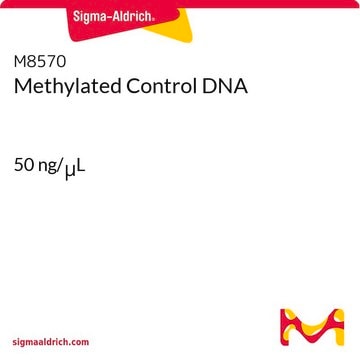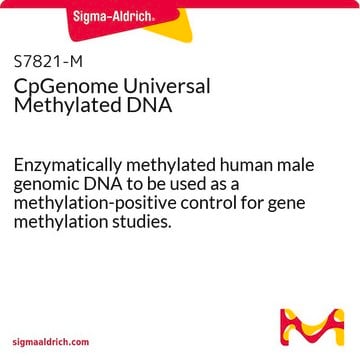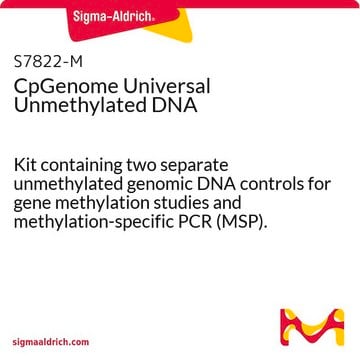This kit can be used for 50 reactions.
MOD50
Imprint® DNA Modification Kit
For bisulfite DNA conversion & purification
Synonym(s):
Methylation-Specifc PCR preparation, bisulfite conversion kit, bisulphite modification
Select a Size
About This Item
Recommended Products
General description
Features and Benefits
- Only 50 picograms of DNA or 20 cells are required
- Procedure takes less than 2 hours
- Greater than 99% conversion rate
- Extremely low degradation
- Option of convenient one-step protocol
- Consistent and reproducible Bisulfite Modification
- Can be used with genomic, endonuclease digested, and FFPE DNA
Storage and Stability
Legal Information
Kit Components Also Available Separately
- T3566Clear-view™ Snap-Cap microtubes, size 1.5 mL, naturalSDS
Signal Word
Danger
Hazard Statements
Precautionary Statements
Hazard Classifications
Acute Tox. 4 Oral - Aquatic Chronic 3 - Eye Dam. 1 - Met. Corr. 1 - Skin Corr. 1A
Supplementary Hazards
Storage Class Code
8B - Non-combustible corrosive hazardous materials
Flash Point(F)
Not applicable
Flash Point(C)
Not applicable
Choose from one of the most recent versions:
Certificates of Analysis (COA)
Don't see the Right Version?
If you require a particular version, you can look up a specific certificate by the Lot or Batch number.
Already Own This Product?
Find documentation for the products that you have recently purchased in the Document Library.
Customers Also Viewed
Articles
Bisulfite treatment distinguishes methylated DNA in gene methylation studies, exploiting the stability of methylated cytosine.
Protocols
Chromatin Immunoprecipitation qPCR for studying gene regulation across conditions.
Related Content
The Imprint DNA Modification Kit provides the reagents needed for bisulfite conversion and post-modification clean-up of DNA samples in less than 2 hours.
-
How many reactions can be run with Product MOD50, Imprint® DNA Modification Kit?
1 answer-
Helpful?
-
-
Can I use Product MOD50, Imprint® DNA Modification Kit with DNA templates that contain high GC content or secondary structures?
1 answer-
Yes, but it will be necessary to increase the bisulfite reaction time to 150 to 180 min.
Helpful?
-
-
What is the Department of Transportation shipping information for this product?
1 answer-
Transportation information can be found in Section 14 of the product's (M)SDS.To access the shipping information for this material, use the link on the product detail page for the product.
Helpful?
-
-
Can you store the DNA modified using Product MOD50, Imprint® DNA Modification Kit?
1 answer-
The modified DNA generated with this kit can be stored for 2 months at -20 °C, 6 months at -80 °C.
Helpful?
-
-
Can Product MOD50, Imprint® DNA Modification Kit, be used on formalin-fixed tissue ?
1 answer-
Yes, it can be used on formalin-fixed tissue, but one would need to amplify the gene of interest before bisulfite treatment
Helpful?
-
-
What is the minimum amount of DNA that can be used with Product MOD50, Imprint® DNA Modification Kit?
1 answer-
DNA amounts ranging from 0.1 ng to 1 mg have been used successfully. For optimal modification, the DNA quantity should be in the range of 50-200 ng.
Helpful?
-
Active Filters
Our team of scientists has experience in all areas of research including Life Science, Material Science, Chemical Synthesis, Chromatography, Analytical and many others.
Contact Technical Service












